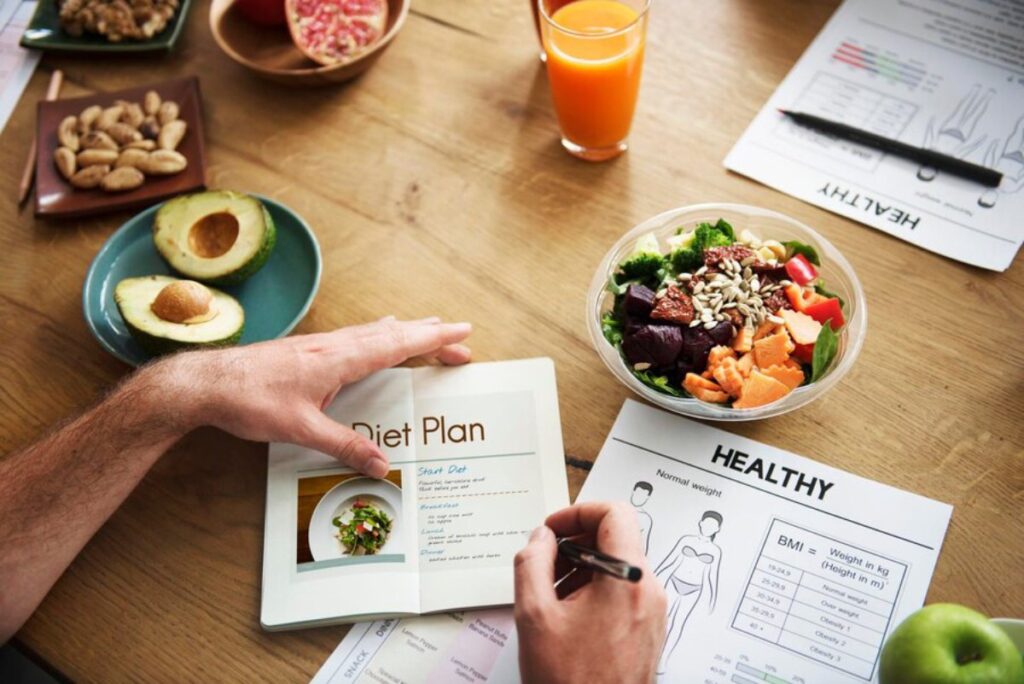The Health & Wellness Blog

Gut-Healthy Anti-Inflammatory Meal Plan: A Path to Digestive Wellness
Lately, gut health has been all the rage. And it’s not just health enthusiasts talking it up — the medical community is listening as well. A properly functioning digestive system is essential for overall health. It has an impact on immunity and mental health.” Studies of the gut-brain relationship suggest that our diets can affect our inner ecosystem.
Maintaining digestive wellness through gut-friendly foods, which are an anti-inflammatory meal plan. This guide to the pros of this diet, expert tips, periodic mistakes, and a detailed meal plan. You can use it to start your journey toward better digestive health.
Why Gut Health Matters
Gut health refers to the balance of microorganisms in your digestive tract. This might include bacteria, fungi and viruses. This complex ecosystem is the gut microbiome. It helps with digestion, produces vital vitamins including B12 and K, and protects the gut lining. If this balance is disrupted, called dysbiosis, a variety of health problems can occur.
A healthy gut contributes to:
- Stronger immunity: About 70% of your immune system is in your gut.
- Mood stability and mental clarity: The gut makes neurotransmitters like serotonin, which affect mood.
- Efficient digestion and nutrient absorption: A balanced microbiome helps extract nutrients from food.
- Lower inflammation: Long-term gut inflammation may result in autoimmune diseases, skin problems, and metabolic issues.
When inflammation affects gut health, it can cause bloating, constipation, diarrhoea, and mental fog. Over time, it may lead to serious conditions like leaky gut syndrome, IBS, and IBD.
Key Benefits of an Anti-Inflammatory Meal Plan
Promotes Digestive Wellness
An anti-inflammatory diet lifts the burden on the digestive system. It eliminates common irritants and emphasises nutrient-dense, soothing foods. These foods help build the lining in your gut, help you have regular bowel movements, and reduce bloating.
Leafy greens, such as spinach, are high in magnesium. But this nutrient helps relax and relieve intestinal cramps. Oats and apple contain soluble fiber, which slows down digestion. This helps maintain a consistent environment for gut bacteria.

Supports Gut Health
A diverse diet high in fibre and fermented foods populates a healthy gut microbiome. Garlic, onions and bananas have prebiotic fibres, which feed good bacteria. Fermented foods such as kefir and kimchi restore gut flora.
These foods aid digestion, protect the gut lining, and enhance immunity. In fact, regular consumption can help restore dysbiosis for increased overall health.
Boosts Overall Health
Beyond gut health, reducing inflammation also improves:
- Heart health: Lower blood pressure and better cholesterol levels.
- Brain function: Less brain fog and improved memory.
- Skin clarity: Reducing inflammation helps with acne and eczema.
- Weight management: Chronic inflammation can disrupt hunger and metabolism hormones.
These benefits show how gut health connects to nearly every body system.
Expert Tips for Anti-Inflammatory Meal Planning
Focus on Whole Foods
Choose whole foods that are close to their natural state, without added sugars or preservatives. This helps minimise triggers for inflammation.
Fill your plate with:
- Colourful vegetables (leafy greens, cruciferous veggies, root vegetables)
- Whole grains (quinoa, brown rice, oats)
- Plant-based proteins (lentils, beans, tofu)
- Healthy fats (avocado, nuts, olive oil)
Aim to eat whole, anti-inflammatory foods 80% of the time, allowing for some flexibility.
Avoid Processed Foods
Processed foods often have trans fats, refined sugars, and additives that can irritate the gut lining. Eating these foods can feed harmful gut bacteria and cause dysbiosis.
Limit or avoid:
- Packaged snacks (chips, crackers)
- Processed meats (sausages, deli meats)
- Refined carbs (white bread, pastries)
- Sugary drinks (soda, sweetened coffee)
Choose homemade options when you can. Use fresh ingredients and natural sweeteners like honey or maple syrup, but do so in moderation.

Include Probiotic-Rich Foods
Probiotic foods add good bacteria to your gut. They help digestion. They boost nutrient absorption. They also make short-chain fatty acids that lower inflammation.
Top probiotic sources:
- Yoghurt with live cultures
- Kefir (fermented milk)
- Miso and tempeh (fermented soy)
- Kombucha (fermented tea)
- Fermented vegetables like kimchi and sauerkraut
Consume probiotics consistently and alongside prebiotic fibers to help them thrive.
Stay Hydrated
Hydration keeps your digestive tract running smoothly. Water helps dissolve nutrients, prevents constipation, and transports waste through the colon.
In addition to drinking water:
- Include water-rich fruits and vegetables (like cucumber, oranges, and watermelon).
- Sip herbal teas like peppermint, ginger, and chamomile to soothe inflammation.
Avoid too much caffeine and alcohol, as both can dehydrate and irritate the gut lining.
Common Mistakes to Avoid
Overlooking Food Sensitivities
Some healthy foods can still trigger inflammation in sensitive individuals. Common culprits include gluten, dairy, soy, eggs, and nightshades (like tomatoes and eggplants).
If you frequently feel digestive discomfort, try an elimination diet. Remove suspected triggers for 2–4 weeks. Then, reintroduce them slowly, one at a time, to find out what bothers you.
Ignoring Portion Sizes
Even healthy foods can overwhelm your digestive system if you eat large portions. This can lead to bloating and indigestion.
Practice mindful eating by:
- Eating slowly and chewing thoroughly.
- Use smaller plates and bowls.
- Listening to your body’s fullness cues.
Skipping Meals
Skipping meals can lead to blood sugar spikes and crashes. This may cause fatigue and cravings for inflammatory foods. It can also upset the balance of gut bacteria that thrive on regular nourishment.
Aim to eat balanced meals at similar times each day. This rhythm supports gut health.
Advanced Insights into Anti-Inflammatory Foods
The Role of Omega-3 Fatty Acids
Omega-3s help reduce inflammation by blocking inflammatory pathways. In the gut, they strengthen the intestinal lining and prevent issues like leaky gut syndrome.
Top omega-3 sources:
- Fatty fish (salmon, mackerel, sardines)
- Flaxseeds and chia seeds
- Walnuts
- Algal oil (a vegan substitute for fish oil)
Try to consume two servings of fatty fish each week or consider a supplement.

Antioxidants and Polyphenols
These plant compounds neutralise free radicals that cause cellular damage and inflammation. Polyphenols also act as prebiotics, nourishing beneficial gut bacteria.
High-antioxidant foods include:
- Berries (blueberries, raspberries, blackberries)
- Dark chocolate (minimum 70% cocoa)
- Green tea
- Herbs and spices like turmeric, cinnamon, and rosemary
Add these to smoothies, teas, and main dishes for extra flavor and health benefits.
Fermented Foods and Gut Health
Fermentation breaks down sugars and starches in food. This process makes nutrients easier to absorb and adds natural probiotics.
Add fermented foods gradually to avoid digestive upset. Start with a few tablespoons per day and increase as tolerated.
Sample Gut-Healthy Anti-Inflammatory Meal Plan
Breakfast
- Oatmeal with Berries and Chia Seeds: Oats help stabilise blood sugar; berries and chia seeds add antioxidants and omega-3s.
- Green Smoothie: Blend spinach, kale, banana, flaxseed, and almond milk for a refreshing, fibre-rich start.
Lunch
- Grilled Salmon Salad: High in omega-3s and healthy fats. Add avocado, arugula, and pumpkin seeds.
- Quinoa and Vegetable Stir-Fry: Use anti-inflammatory veggies such as broccoli, bell peppers, and bok choy. Add garlic and ginger for extra flavour.
Dinner
- Lentil Soup: Lentils provide plant-based protein and gut-friendly fibre. Add turmeric for extra anti-inflammatory benefits.
- Baked Sweet Potato with Black Beans: A colourful, filling meal rich in antioxidants and complex carbs that support gut bacteria.
Snacks
- Greek Yoghurt with Honey and Walnuts: Combines probiotics, healthy fats, and a touch of sweetness.
- Carrot and Celery Sticks with Hummus: A crunchy, fibre-rich snack that supports gut flora and curbs hunger.
Nourishing Your Gut for Long-Term Wellness
To explore this link and take charge of your digestive health, start with: If you select gut-friendly, anti-inflammatory foods, you can help digestion and minimise aches. It also provides a foundation for long-term well-being.
Keep in mind that change takes time. Begin with small but sustainable changes — replacing refined grains with whole grains or introducing one probiotic food each day. As your gut health gets better, you may see a ripple effect: better energy, improved mood, clearer skin, and a stronger immune system.
Ready to get started? Start incorporating these gut-friendly meals into your regimen. Tell other fellow about your experience. Together we can spread the word of digestive wellness—one meal at a time.









